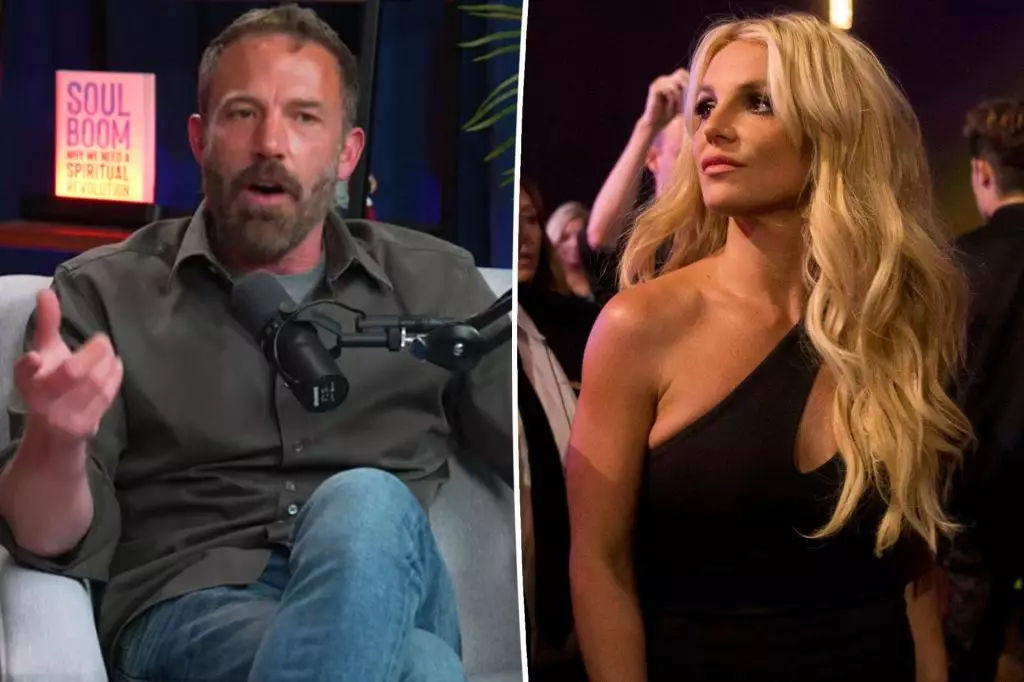In an era where celebrity lives are incessantly scrutinized, Ben Affleck’s recent comments about Britney Spears resonate deeply with the complex dynamics of fame and the invasive nature of pop culture. On the “This Past Weekend With Theo Von” podcast, Affleck spoke candidly about feeling compassion for Spears during her tumultuous times, particularly when she became a target for relentless paparazzi harassment. His acknowledgment serves as a poignant reminder of how fame can strip away the humanity of individuals, casting them as mere icons rather than people with genuine struggles.
Affleck’s admission sheds light on a disturbing phenomenon—the treatment of celebrities as commodities for public consumption. While many people might have dismissed Spears’ public meltdowns as erratic behavior, Affleck recognized that these reactions were likely exacerbated by an abusive media landscape. He reflected on the “weird, unintentional” collective cruelty that society often employs, illustrating how the relentless scrutiny amplifies the challenges faced by those in the limelight. It’s a sobering revelation that not only captures the essence of Spears’ situation but also invites a larger discussion about how society perpetuates harm through its fascination with celebrity culture.
Understanding the Paparazzi’s Role
Paparazzi, as Affleck pointed out, are not mere observers but active participants in crafting narratives around celebrities. They invade personal spaces and provoke responses that are then broadcasted to the world. The act of “poking” at these public figures can produce an environment that breeds conflict and anxiety, culminating in chaotic spectacles that viewers consume without pondering the toll on the individual’s psyche. Affleck’s metaphor of the “growling animal” becomes pertinent; society often overlooks the coercive nature of these interactions, focusing solely on the public reaction rather than the ongoing aggression that led to it.
This criticism of the paparazzi culture is particularly relevant in a landscape where social media amplifies these voyeuristic tendencies. The barriers between celebrity and audience have become increasingly porous, leading to real-time commentary and judgment that can create devastating impacts on mental health. By framing the conversation around empathy, Affleck urges the audience to reconsider their consumption habits and the narratives they subscribe to—promoting a culture of kindness rather than one that thrives on spectacle.
A Historical Context: Spears’ Battle with the Media
The period Affleck references is crucial in understanding the broader context of Spears’ experiences with fame. Many remember the public spectacle that ensued around 2007-2008 when Spears faced what many would classify as a public breakdown. The fallout included a series of chilling instances—shaving her head, being placed on psychiatric hold, and enduring a lengthy conservatorship that stripped her of autonomy. For Affleck to express that he “may or may not” have felt empathy for Spears indicates a reluctance to fully claim a narrative while still acknowledging the profound emotional distress she endured—a nuanced approach in recognizing the risks of oversimplifying complex human experiences.
It is evident that Affleck didn’t just regionalize his empathy; rather, he identified a systemic issue where the focus often leans toward entertainment, neglecting the corresponding ethical obligations that society bears. His reflections could serve as a catalyst for ongoing discussions about mental health awareness within the entertainment industry, prompting a reevaluation of how public figures are portrayed in media narratives.
The Importance of Compassion in Celebrity Narratives
Affleck’s conversations about Spears underscore a much-needed cultural shift toward empathy in celebrity narratives. Rather than merely viewing these personalities as characters in a story, the audience is encouraged to approach them as real people facing unique challenges. The revelations—while not entirely new—spark conversations about the dire need to humanize individuals in the entertainment industry, particularly as discussions surrounding mental health become increasingly pivotal.
As fans and consumers of celebrity culture, it’s vital to maintain a critical lens toward how narratives are constructed around public figures. Affleck’s introspections challenge us to examine the collective role we play in shaping celebrity experiences, advocating for a cultural environment that supports understanding rather than judgment. The responsibility lies with us to foster a space where compassion prevails over sensationalism, and empathy supersedes criticism—a powerful reminder of the humanity intrinsic to all individuals, regardless of their public personas.

